![]()
Why should the poor always have to pay for the misdeeds of the government, of the rich?
This question surfaced yet again when I stood outside Rangs building on the morning of Dec 12.
Rangs, one of the largest business houses in Bangladesh, had their building plans approved by Rajuk (Rajdhani Unnoyon Kortripokkho, i.e., Capital Development Authority), and they built a huge edifice. Approval for high rises are generally not given in this area due to flight restrictions. Six storied buildings are the limit. However, Rangs built a 22 storied building which no one could miss. Except Rajuk, of course.
That is how things stood until the present caretaker government came into power and rushed headlong into its drive against corruption.
? Which officials in Rajuk had okayed these plans? And why? That has remained a secret. Has anyone in Rajuk been punished for approving these plans?
? The Supreme Court ordered the demolition of the building, and Rajuk appointed Six Star, a ship-breaking company to carry out the work. Who made the decision? On what basis? What qualifications did Six Star have? Was any corruption involved? If so, will those involved be tried?
? After the demolition disaster, Six Star, Rajuk, Rangs — will they be made accountable for their misdeeds?
Is a life worth only one lakh taka — the sum that the government will pay as compensation for those who have died?
‘They don’t give us our dead’
An elderly man sat 50 feet away from the Rangs building on a second floor veranda of a shopping market. After the innards of the building had collapsed, many workers had taken shelter in this veranda. The elderly man had come to Dhaka early this morning with his son-in-law, in search of his son’s body. He muttered something when I asked him if he had spoken to anyone here. I couldn’t make sense, and repeated my question. I could barely make out what he said, “They don’t give us our dead.” He told me he had come from Gaibandha, and I thought to myself, now we can be sure that one of those who have died is from Gaibandha.
A woman has rushed over from Modhukhali. Her brother has suffered a head injury. But thankfully, he is alive, and he will live. At least ten people from Modhukhali are thought to have died in the demolition disaster.
Hajari, one of the workers hired for demolition said, one of the building’s security men is missing. He had last been seen on one of the topmost floors of the building. “It all happened in less than 30 seconds.” Hajari and the other workers had scrambled down the floors to save themselves.
I spoke to some of the workers and it seemed that no one from Rajuk or Six Star, at least not any one in a position of authority had contacted them, or spoken to them, let alone reassured them. Class distances are such that the workers themselves had not gathered the courage to talk to Rajuk officials.
Six Star company, Hajari told me, had brought the main group of workers from Chittagong. Being a port city, Chittagong is a place where people from different parts of the country migrate to in search of work. Hajari’s home is Barisal but he has lived for many years in Chitagong. “Six Star,” he said, “they will provide compensation. They are ever-ready. In Chittagong dock, every month you get to see one or two workers die, such accidents keep happening.” Most of those who had survived the Rangs disaster had been sent back by Six Star. Only 50 workers had been kept back for the rescue effort.
Six Star was paying the workers daily wages and also providing meal charges. From tonight (Dec 12) , the company would also arrange workers’ boarding. This is what Hajari had told me but when I spoke to two other workers, they said they were not being paid their regular wages. Neither were labour shordars giving them money to buy food.
On the market verandah I came across another worker, who was released yesterday from Dhaka Medical College. He had received back injuries, so said the hospital slip. He did not have the money to buy the medicine that had been prescribed. Painkillers on an empty stomach would do him more harm than good. He told me that he had slept on a thin sheet of cloth the night before, and that his pain had increased.
An old story of anguish and suffering
As we talked with the workers and their relatives, I noticed an elderly, bearded man speaking nearby. He was noticeably agitated. I took him to be a demolition worker. I moved closer to where he stood and heard him say, “If they had been the sons of MPs and Ministers, would the dead bodies have been left hanging? People would have been running around breathlessly. We are cchotolok, why should anyone bother?” I later found out that he didn’t work for Rangs, that he worked somewhere else nearby. Listening to him was like listening to a broken record. I was reminded yet again of how helpless poor people are.
It should not have happened. It should not have been allowed to happen. It is something that should have caused a government’s downfall. It is amazing that such things keep happening. Almost daily. And ceaselessly.
Newspaper reporting
At home, we read Prothom Alo. In terms of reporting, it is one of the finest newspapers in the country. I quickly skimmed the reportage on Rangs, once again today. None of the reports focus on who is to blame for the disaster, they tend to highlight the accident-al nature of the disaster. I see an editorial, but I do not have the time to read it. Those who read other newspapers will know how it has been reported in other dailies. Some may cite cyclone Sidr, or the harassment of university teachers as reasons for such reporting but I find it difficult to agree. I think the un-focused reporting is deliberate.
But I must not be too harsh. After all, it is news reporters who keep the story alive as those who are guilty hide behind screens of authority.
People’s distrust
Tonight I have learnt that 14 coffins have been taken inside. Since then, family members of the workers have refused to leave the area. Many of them think that the authorities will get rid of the bodies. They have come from outside Dhaka, they do not belong here, they have no networks of familial or social support in this city. They can only gather and resist with whatever they have.
Will the authorities really get rid of the dead bodies? Will they not hand over to grieving family members the bodies of their beloved ones? You may think I am jumping to conclusions but it is true that the whole process is shrouded in secrecy, and that those in authority are trying to save their skin.
Yesterday afternoon as I stood outside Rangs Bhaban, I could catch the faint smell of decomposing bodies. The smell will get stronger. Fire Brigade workers, who are on standby, do not know when rescue efforts will begin.
I belong to the ranks of the ordinary people, I belong to those who are toothless and clawless. Yet I cannot help but think, those who are guilty must not be allowed to get away. At least, not this time.
Priscilla Raj
1:00 am
Dec 13, 2007
[translation: rahnuma ahmed]
Bangladeshi journalists Priscilla Raj and Saleem Samad, who had worked for the Channel 4 team as interpreter and fixer, respectively, were also detained and charged with involvement in ?anti-state activities.? Raj was released on bail in December 2002.
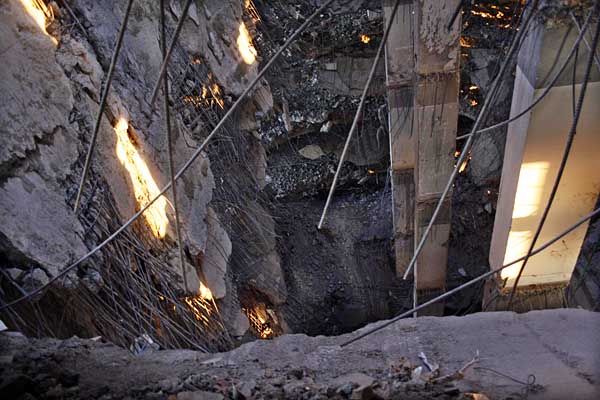 Collapsed floor of Rangs Building. December 9. 2007 ? Munir uz Zaman/DrikNews
Collapsed floor of Rangs Building. December 9. 2007 ? Munir uz Zaman/DrikNews
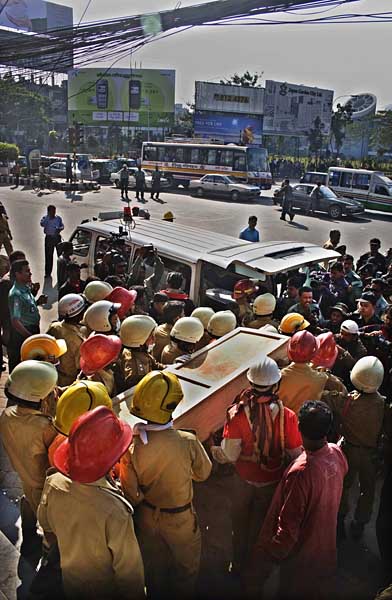 Body released by Fire Brigade being sent to morgue. ? Azizur Rahim Peu/DrikNews
Body released by Fire Brigade being sent to morgue. ? Azizur Rahim Peu/DrikNews
We rushed as soon as we received the tip off, sneaking away from our workshop on “Investigative Journalism for Television.” Working our way round the devotees praying on Panthapath we rushed to the National Museum.
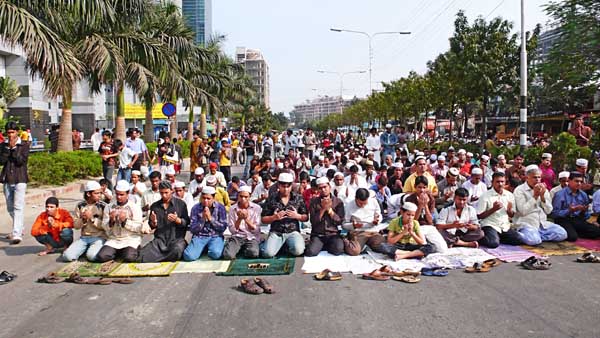 Jumma prayers on Panthapath. Friday December 7. 2007. ? Shahidul Alam/Drik/Majority World
Jumma prayers on Panthapath. Friday December 7. 2007. ? Shahidul Alam/Drik/Majority World
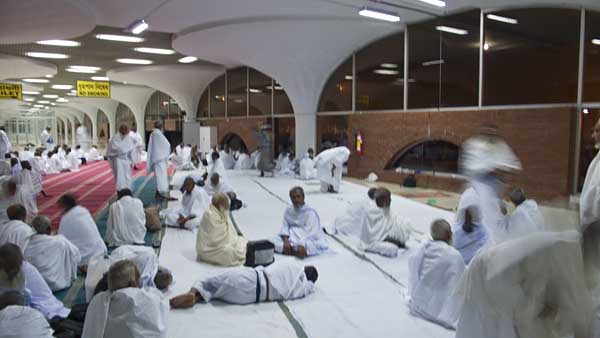 Hajis at Zia International Airport. Saturday December 8. 2007. ? Shahidul Alam/Drik/Majority World
Hajis at Zia International Airport. Saturday December 8. 2007. ? Shahidul Alam/Drik/Majority World
It was a false alarm. The trucks had left, and the artefacts that were still left in the National Museum were safe. At least for the moment. The remaining week, my book launch in Glasgow,
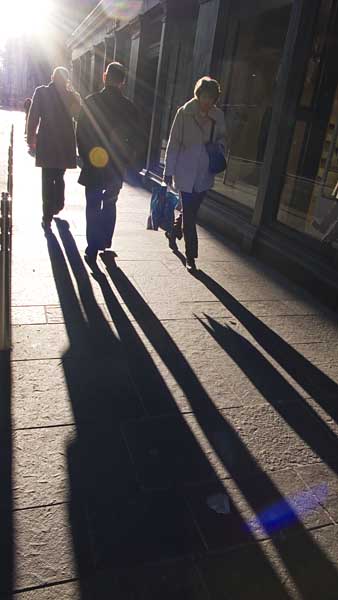 Glasgow. December 10 2007. ? Shahidul Alam/Drik/Majority World
Glasgow. December 10 2007. ? Shahidul Alam/Drik/Majority World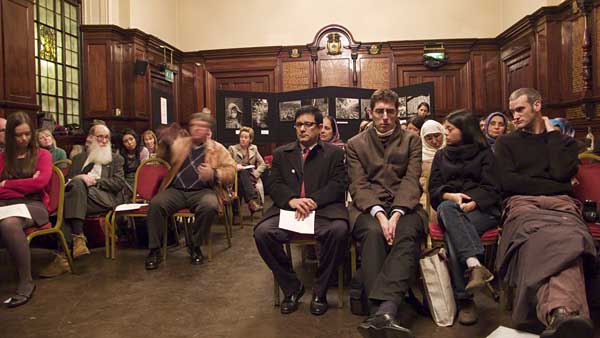 Glasgow. December 10 2007. ? Shahidul Alam/Drik/Majority World
Glasgow. December 10 2007. ? Shahidul Alam/Drik/Majority World
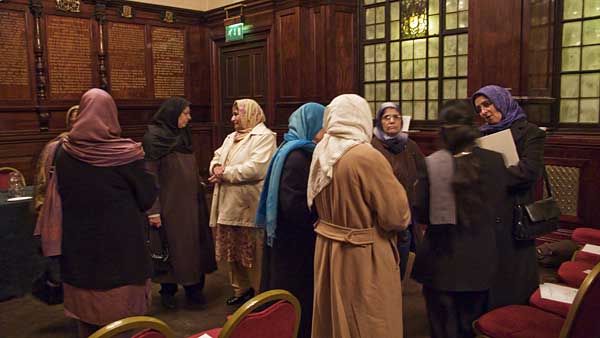 Glasgow. December 10 2007. ? Shahidul Alam/Drik/Majority World
Glasgow. December 10 2007. ? Shahidul Alam/Drik/Majority World
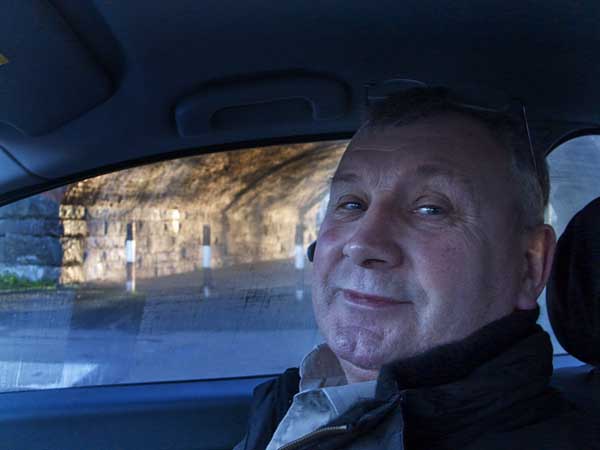 Taxi driver Robert who had worked at Port Glasgow. Ships later taken apart in Chittagong, Bangladesh, started their journey here. December 10 2007. ? Shahidul Alam/Drik/Majority World
Taxi driver Robert who had worked at Port Glasgow. Ships later taken apart in Chittagong, Bangladesh, started their journey here. December 10 2007. ? Shahidul Alam/Drik/Majority World
the Prince Claus Fund Award ceremony in Amsterdam and the conference “Visible Rights” at Harvard, took me from a sunny afternoon in Scotland to the snow covered streets of Cambridge.

Though Jon Husband had helped me setup my blog, I had never met him before. Jeroen picked me up at Schipol, and Jon, Jeroen and I had dinner at the Bazar Middle Eastern restaurant in Amsterdam. December 10. 2007. ? Shahidul Alam/Drik/Majority World
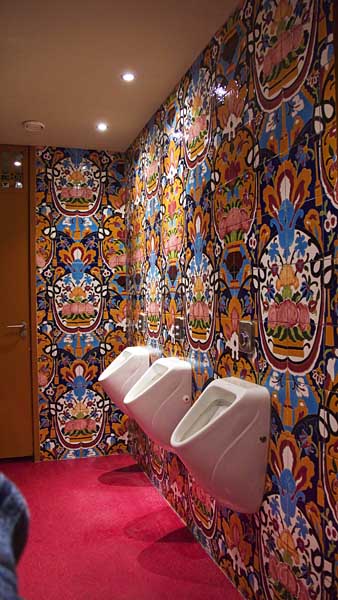 The ornate loo at the Bazar Middle Eastern restaurant in Amsterdam. December 10. 2007. ? Shahidul Alam/Drik/Majority World
The ornate loo at the Bazar Middle Eastern restaurant in Amsterdam. December 10. 2007. ? Shahidul Alam/Drik/Majority World
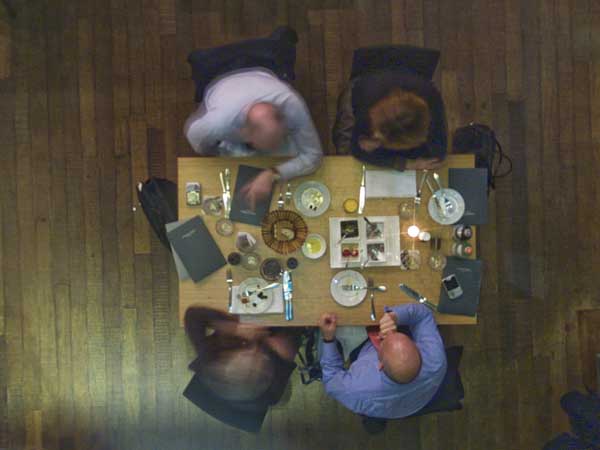 Diners seen through the glass floor at Muziekgebouw. Amsterdam. Dec 12. 2007. ? Shahidul Alam/Drik/Majority World
Diners seen through the glass floor at Muziekgebouw. Amsterdam. Dec 12. 2007. ? Shahidul Alam/Drik/Majority World
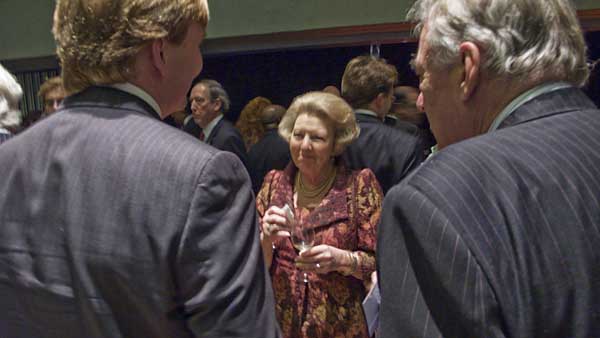 Queen Beatrix at Prince Claus Fund Award Ceremony at Muziekgebouw. Amsterdam. Dec 12. 2007. ? Shahidul Alam/Drik/Majority World
Queen Beatrix at Prince Claus Fund Award Ceremony at Muziekgebouw. Amsterdam. Dec 12. 2007. ? Shahidul Alam/Drik/Majority World
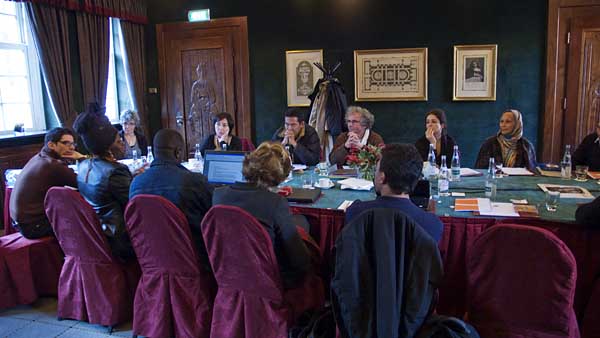 Network meeting of Prince Claus Fund at Grand Hotel, Amsterdam. December 13th 2007. ? Shahidul Alam/Drik/Majority World
Network meeting of Prince Claus Fund at Grand Hotel, Amsterdam. December 13th 2007. ? Shahidul Alam/Drik/Majority World
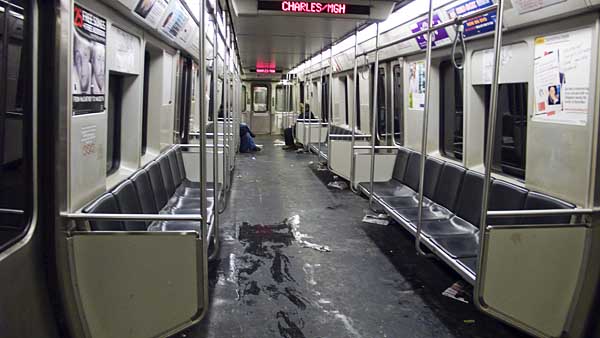 Train at Boston December 14. 2007. ? Shahidul Alam/Drik/Majority World
Train at Boston December 14. 2007. ? Shahidul Alam/Drik/Majority World
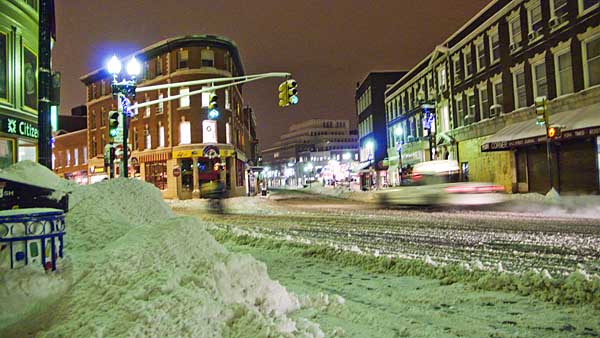 Outside Harvard train station at 2:00 am. December 14. 2007. ? Shahidul Alam/Drik/Majority World
Outside Harvard train station at 2:00 am. December 14. 2007. ? Shahidul Alam/Drik/Majority World
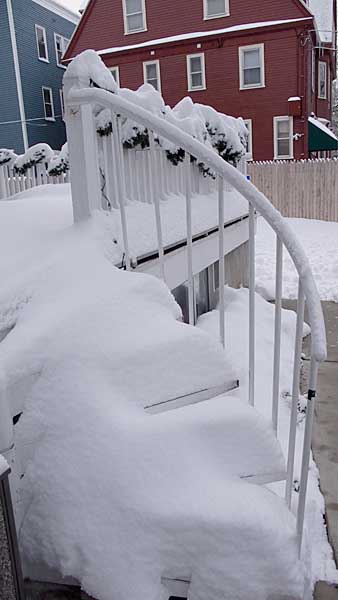 Stairs at Irving House. December 14. 2007. ? Shahidul Alam/Drik/Majority World
Stairs at Irving House. December 14. 2007. ? Shahidul Alam/Drik/Majority World
There was good news in between. The Rajshahi University teachers being released was a great relief, but the deaths of workers at Rangs Building, and the slum fire in Begunbari reminded me how far my own life was from the reality of workers and slum dwellers of my land.
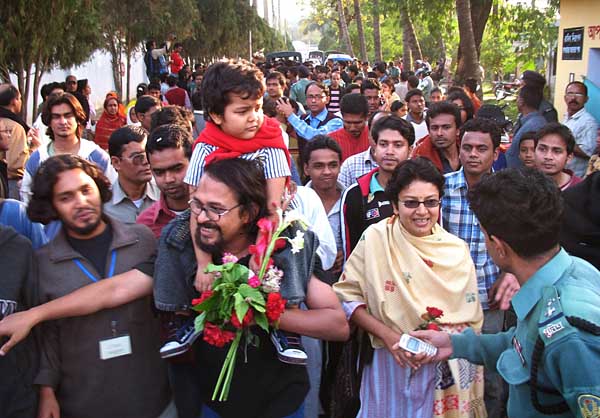 Detained Rajshahi University teachers, released after being granted a presidential pardon. December 10. 2007. ? Iqbal Ahmed/DrikNews
Detained Rajshahi University teachers, released after being granted a presidential pardon. December 10. 2007. ? Iqbal Ahmed/DrikNews
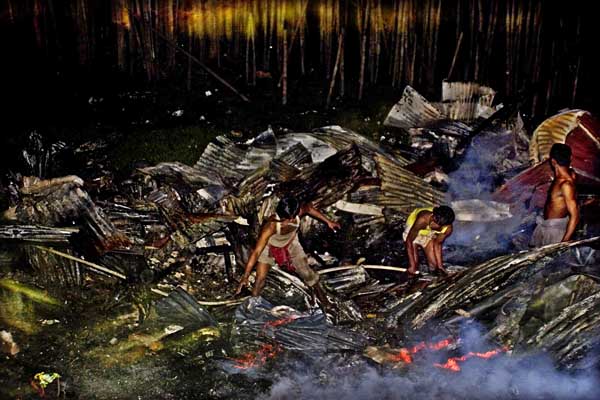 Fire in Begunbari slum. December 15. 2007. ? Zaid Islam/DrikNews
Fire in Begunbari slum. December 15. 2007. ? Zaid Islam/DrikNews
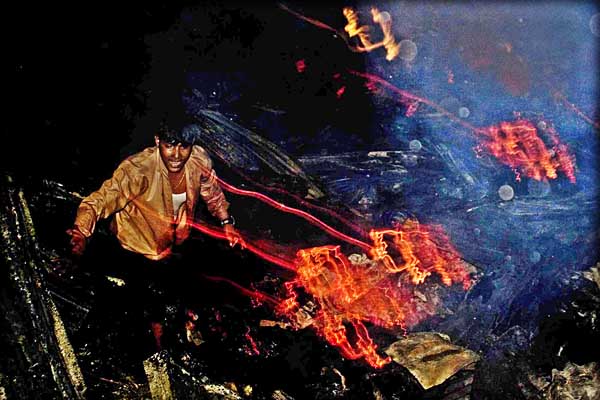 Fire in Begunbari slum. December 15. 2007. ? Zaid Islam/DrikNews
Fire in Begunbari slum. December 15. 2007. ? Zaid Islam/DrikNews
While the gatekeepers who rule our land remain untouched by the death of the poor. While media houses remain in the hands of wealthy business people. While opulent adverts by Grameen, Banglalink and Warid influence what gets reported in mainstream, the lives of media professionals like Priscilla Raj, Tipu Sultan, Probir Shikdar and Tasneem Khalil will continue to be under threat, The war criminals supporting the Pakistan Army had killed our intellectuals on the month of victory in 1971. December has another meaning for the workers and the slum dwellers who live under different military rulers.


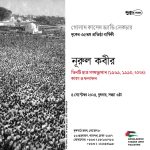
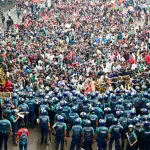

Leave a Reply
You must be logged in to post a comment.